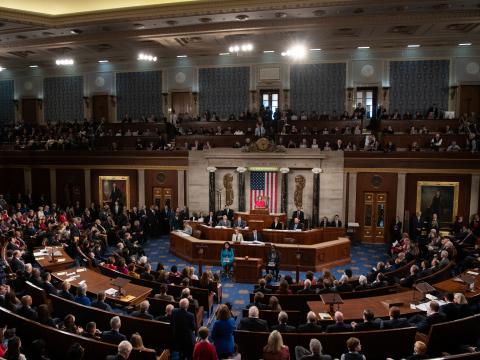A new bill seeks to dramatically increase financial relief for struggling American families amid the ongoing coronavirus pandemic by extending the government’s stimulus checks months after the crisis is over.
The Monthly Economic Crisis Support Act, introduced Friday by Sens. Kamala Harris (D-Calif.), Bernie Sanders (I-Vt.) and Ed Markey (D-Mass.), would provide a monthly $2,000 check to every person with an income below $120,000 throughout the public health crisis and for three months after it officially ends.
In late March, the Senate passed a $2 trillion package called the Coronavirus Aid, Relief, and Economic Security Act, but the trio of progressive senators believes it’s insufficient.
“The CARES Act gave Americans an important one-time payment, but it’s clear that wasn’t nearly enough to meet the needs of this historic crisis,” Harris said in a statement. “Bills will continue to come in every single month during the pandemic and so should help from the government.”
The plan stands a poor chance of passage in the Republican-controlled Senate, which has soured on spending. But with more than 30 million people unemployed over the last seven weeks and no end to the pandemic in sight, Democrats are aiming to up the pressure on congressional leaders as they begin discussions over another fiscal relief package that is expected sometime this month.
The CARES Act provided Americans making up to $99,000 with a maximum of $1,200, with families eligible to receive an additional $500 per child. The checks were limited to Americans with a Social Security number who filed a tax return in the last couple years. The new bill offered by Senate Democrats would not impose such limitations.
The plan would forbid debt collectors from seizing rebate payments, something that has occurred with the Trump administration’s blessing under the CARES Act. It would also ensure that homeless people and foster children receive payments.
“Providing recurring monthly payments is the most direct and efficient mechanism for delivering economic relief to those most vulnerable in this crisis, particularly low-income families, immigrant communities, and our gig and service workers,” Markey said in a statement.
The senators did not provide a cost estimate for the legislation, though given the expanded timeline and the increased amount per check, it would likely eclipse the cost of the first round of stimulus checks under the CARES Act (about $300 billion).
A couple of House Democrats introduced a similar measure last month that would provide monthly checks to Americans until unemployment falls to pre-coronavirus levels.
The House is expected to take the lead on writing the next coronavirus relief bill, with a draft to come as early as next week. On a call with her caucus on Thursday, House Speaker Nancy Pelosi (D-Calif.) and other lawmakers voiced support for including $2,000 in recurring monthly payments in the next package for Americans.
Latest Stories
-
Vasseur questions ‘strange momentum’ of Formula One race director change
15 mins -
“I am disappointed in Kojo Manuel” – Merqury Quaye on “no tie” comment
16 mins -
Nana Kwame Bediako; The beacon of unity
18 mins -
Western Region: NDC youth wing embarks on phase 2 of ‘retail campaign’
44 mins -
Action Chapel International holds annual Impact Convention in November
44 mins -
Jana Foundation urges young women to take up leadership roles
49 mins -
All set for Joy FM Prayer Summit for Peace 2024
1 hour -
Managing Prediabetes with the Help of a Dietitian
1 hour -
Joy FM listeners criticise Achiase Commanding Officer’s election comment
2 hours -
Legal Aid Commission employees threaten strike over poor working conditions
2 hours -
Ghana ranked 7th globally as biggest beneficiary of World Bank funding
2 hours -
IMF board to disburse $360m to Ghana in December after third review
2 hours -
Former Bono Regional NPP organiser donates 13 motorbikes to 12 constituencies
2 hours -
Securities industry: Assets under management estimated at GH¢81.7bn in quarter 3, 2024
2 hours -
Gold Fields Ghana Foundation challenges graduates to maximise benefits of community apprenticeship programme
4 hours

